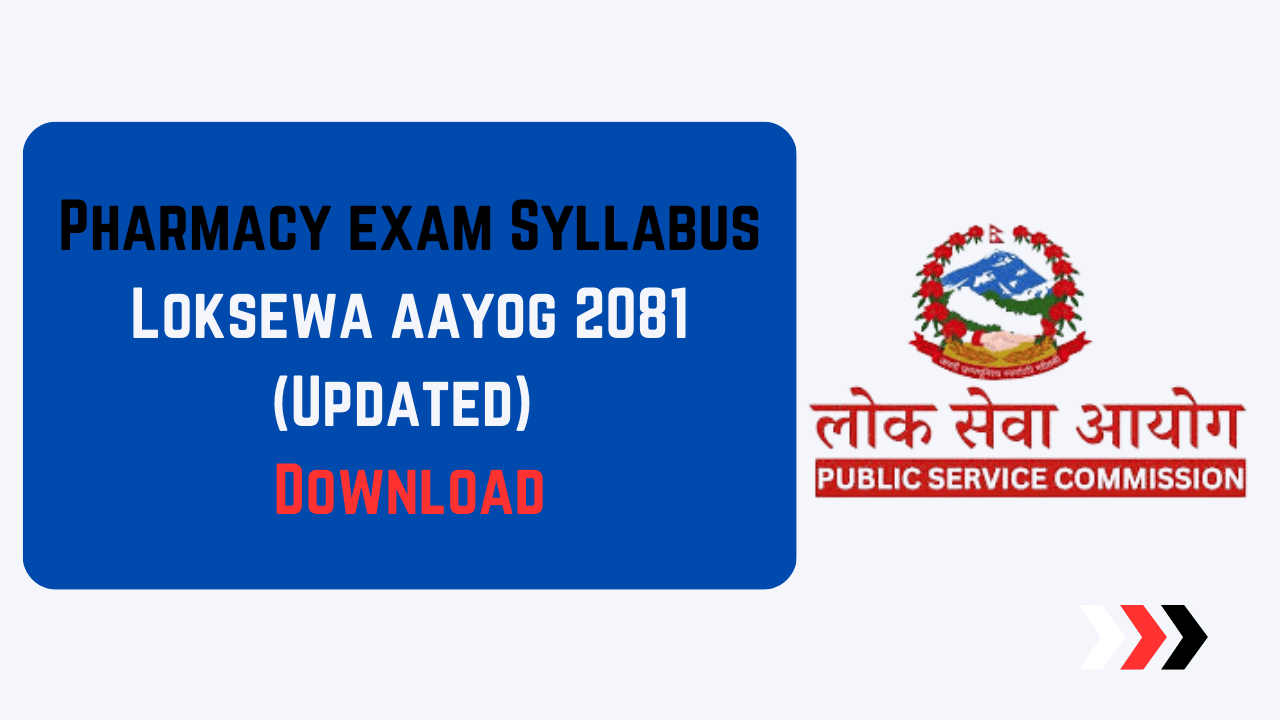The Pharmacy exam conducted by Loksewa Aayog is tailored to assess the professional knowledge and practical skills required for pharmacists in the public sector. It evaluates candidates on their technical proficiency, understanding of pharmaceutical sciences, and knowledge of relevant regulations.
First Paper Syllabus: General Pharmacy Knowledge and Current Affairs
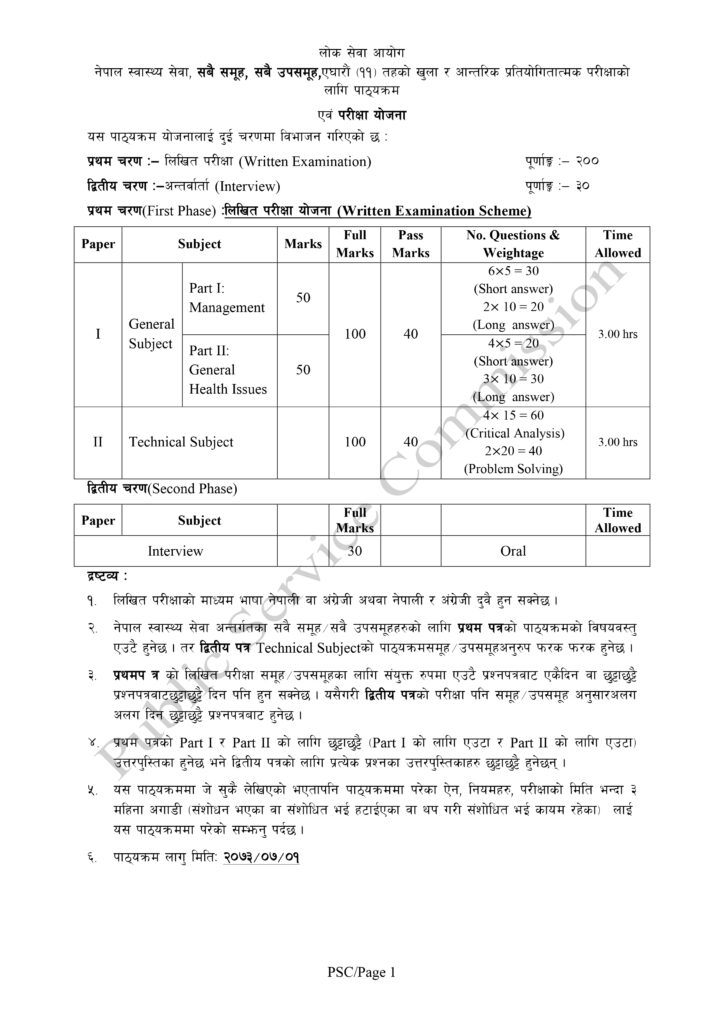
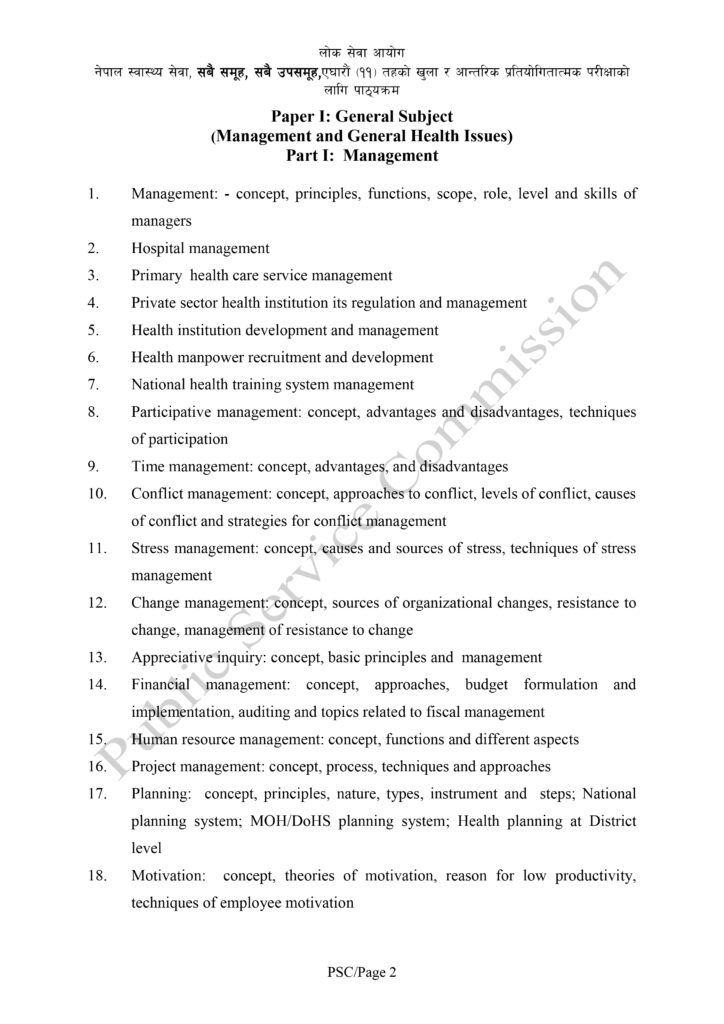
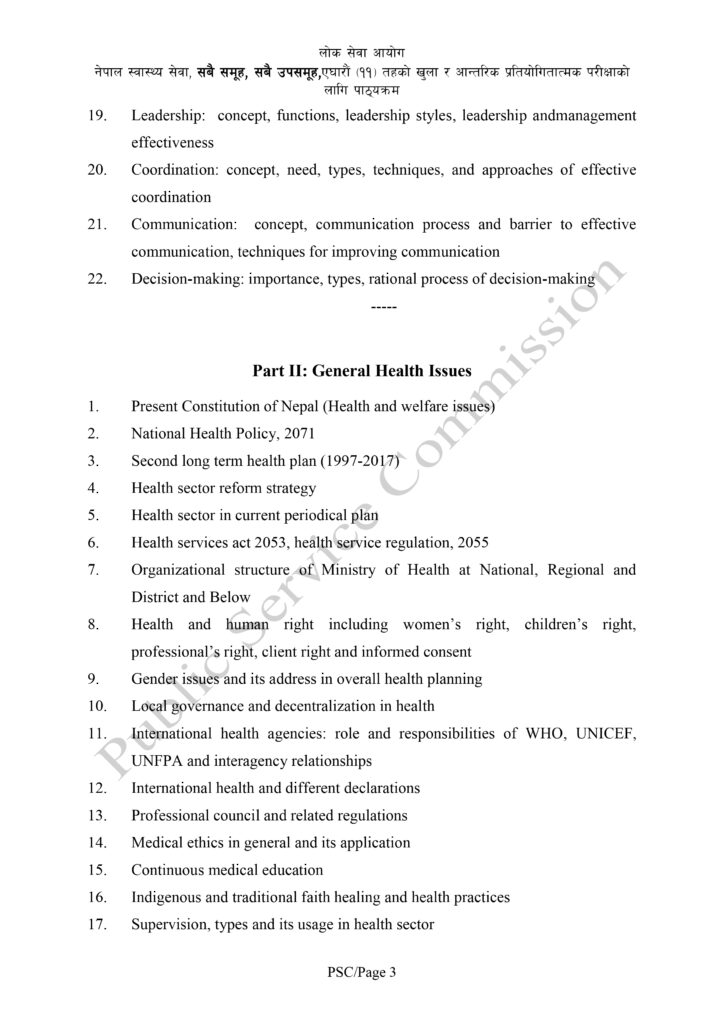
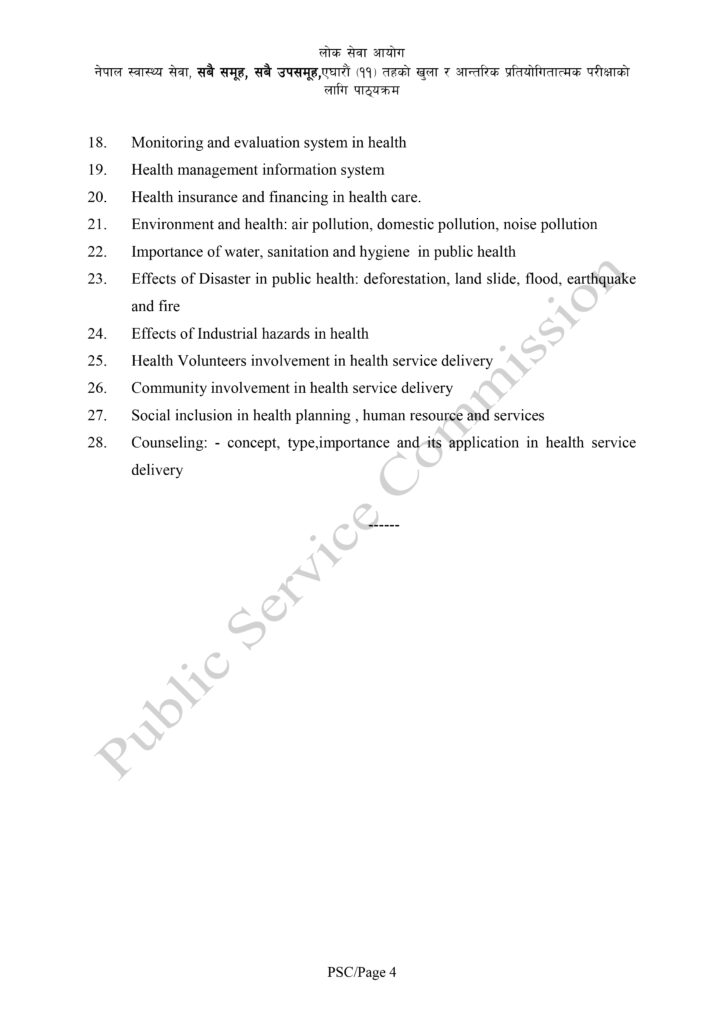
The first paper focuses on assessing candidates’ overall knowledge of the pharmaceutical field along with their awareness of current events and governance.
Key Topics Covered:
- General Knowledge and Current Affairs:
- Recent national and international developments.
- Contributions of Nepal’s health policies and global pharmaceutical updates.
- Advances in the pharmaceutical industry.
- Basics of Pharmaceutical Science:
- Introduction to pharmacology, pharmaceutics, and pharmaceutical chemistry.
- Overview of drug development and testing.
- Health and Regulatory Framework:
- Nepal’s Drug Act and international regulations.
- Principles of good governance in health services.
- Aptitude and Logical Reasoning:
- Basic mathematical concepts.
- Analytical reasoning related to drug formulation.
- Language Proficiency:
- Writing skills in English and Nepali.
- Essay and report preparation on pharmaceutical and healthcare topics.
Second Paper: Professional and Technical Expertise
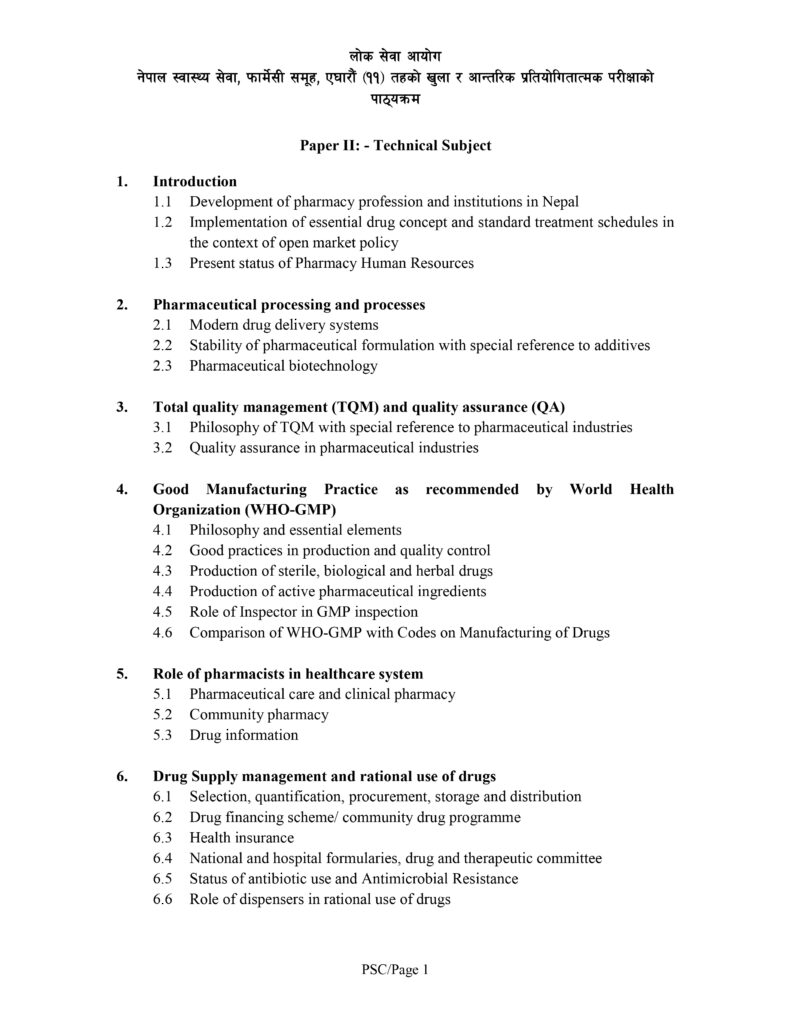
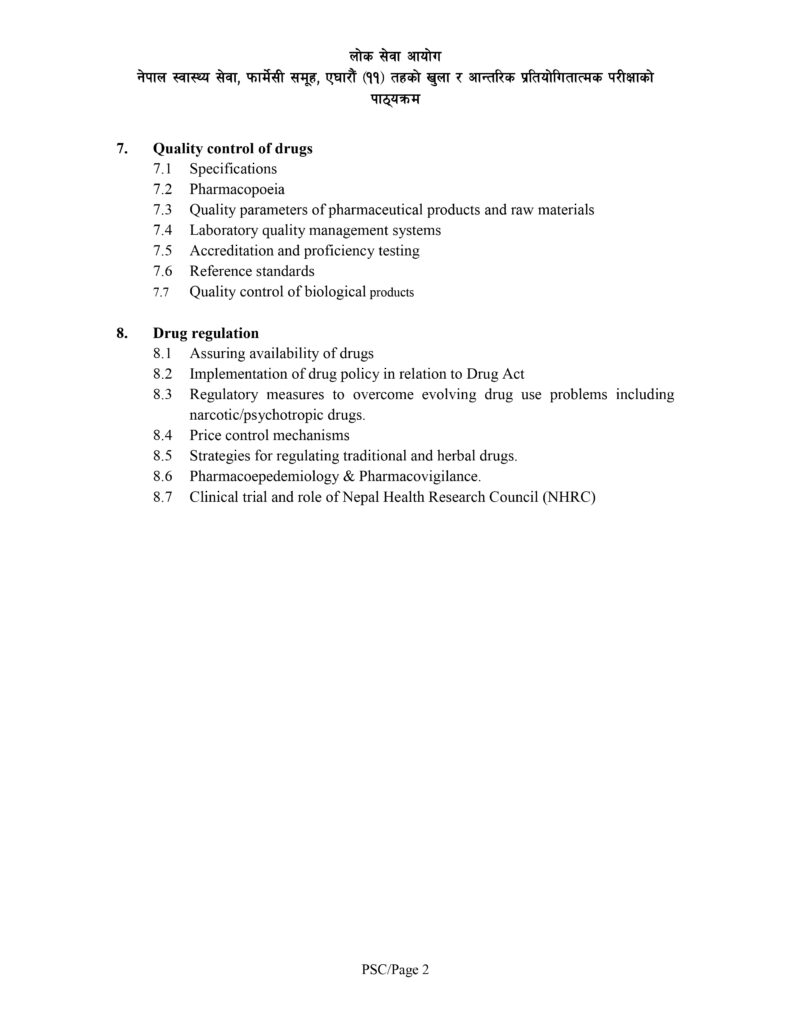
The second paper evaluates candidates’ advanced knowledge and practical understanding of pharmaceutical sciences and their application in the real world.
Key Topics Covered:
- Pharmaceutical Chemistry:
- Advanced organic, inorganic, and analytical chemistry.
- Synthesis and evaluation of pharmaceuticals.
- Pharmaceutics:
- Formulation development for tablets, syrups, injectables, and other dosage forms.
- Techniques in controlled drug release systems.
- Advances in biopharmaceutics.
- Clinical Pharmacology and Therapeutics:
- Drug efficacy and mechanisms of action.
- Clinical guidelines for disease management.
- Case studies on patient-centered drug therapy.
- Hospital and Clinical Pharmacy:
- Managing hospital pharmacies effectively.
- Safe medication practices and counseling.
- Standards of rational prescribing.
- Pharmacognosy:
- Medicinal plant-based drug discovery.
- Role of traditional and alternative medicine systems.
- Policy and Jurisprudence:
- Local regulations on drug manufacturing and distribution.
- Pharmacist’s ethical roles and responsibilities.
- Global treaties affecting Nepal’s pharmaceutical regulations.
Exam Format:
- Written Test: Comprehensive questions on subject expertise.
- Scenario-based Questions: Real-world challenges requiring analytical skills and decision-making.
These exams are structured to ensure that candidates possess both the technical proficiency and a broad understanding of the regulatory, ethical, and practical responsibilities essential for a public healthcare pharmacist.
Preparation Tips and Tricks
Preparing for the Loksewa Aayog Pharmacy exam requires a strategic approach to cover the broad syllabus effectively. Here are some key tips:
- Understand the Syllabus:
- Break down the syllabus into manageable sections and allocate specific time for each.
- Focus on high-priority topics such as pharmacology, pharmaceutics, and pharmaceutical chemistry.
- Use Standard Study Materials:
- Refer to textbooks, research articles, and official guidelines for pharmacy.
- Utilize Loksewa Aayog-recommended resources and practice question papers from previous years.
- Stay Updated on Current Affairs:
- Follow national and international developments in healthcare and pharmaceuticals.
- Regularly read newspapers, journals, and online portals for updates.
- Practice Problem-Solving:
- Solve sample questions, mock tests, and scenario-based problems.
- Pay attention to time management and accuracy during practice sessions.
- Focus on Language Skills:
- Improve writing proficiency in both English and Nepali.
- Practice writing essays, reports, and official communication on healthcare topics.
- Revise Regularly:
- Schedule weekly revisions to reinforce important concepts.
- Use flashcards and summary notes for quick reviews.
- Join Study Groups or Classes:
- Collaborate with peers to exchange knowledge and resources.
- Consider joining online or offline preparatory classes for expert guidance.
- Take Care of Your Health:
- Maintain a balanced diet, get adequate sleep, and manage stress effectively.
- Regular breaks and a healthy routine can improve focus and productivity.
Conclusion
The Pharmacy exam conducted by Loksewa Aayog is a well-rounded assessment aimed at evaluating both the foundational and advanced knowledge of aspiring pharmacists. The first paper lays the groundwork by testing general knowledge and awareness, while the second paper dives deeper into technical expertise and practical skills. Success in this exam requires a balanced approach to preparation, focusing on both theoretical understanding and practical application. By passing this exam, candidates can contribute effectively to Nepal’s public health system, ensuring quality healthcare for the community.
